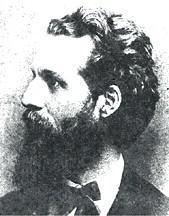
1835 - 1879 Person Name: Alexander Clark, D.D. Author of "Behold, what a Wonder!" in Good as Gold Clark, Alexander, D.D., born March 10, 1835, died July 6, 1879. Dr. Clark was for many years a Minister of the American Methodist Episcopal Church, and the editor of the Methodist Recorder, published at Pittsburgh. Two of his hymns:—
1. Heavenly Father, bless me now. Lent.
2. Make room for Jesus. Lent.
are given in I. D. Sankey's Sacred Songs & Solos.
--John Julian, Dictionary of Hymnology (1907)
=========================
Clark, Alexander, D.D. (March 10, 1835--July 6, 1879). Of Scottish descent, he was born in Jefferson County, Ohio, and received his education in the common schools, guided by a very competent father. After teaching in the public schools of Ohio for some years, he founded and edited Schoolday Visitor, a young people's journal which he published by himself in Knoxville, Ohio. It reached a circulation of more than 30,000 and eventually was merged with St. Nicholas, a well-known magazine for youth.
Originally a Presbyterian, he joined the Methodist Protestant Church and received his preaching license in 1862. For four years, from 1866, he served the First Methodist Protestant Church, Pittsburgh, and then became editor of the Methodist Recorder and the Sunday School papers of his church, retaining that position until his death. Chairman of the Committee which compiled the Voice of Praise, 1872, he was largely responsible for including in it much new hymnic material. He was the author of five hymns which were included in the book. His "Heavenly Father, bless me now," originally in six four-line stanzas, continued in the series of Methodist Protestant hymnals through that of 1901. Stanzas 1, 2, 5, 6, are in 0/1935. [note: up to 1966 Methodist Hymnal.]
He was the recipient of honorary degrees from Mt. Union College, Otterbein University, and Ohio Wesleyan University. While on a lecture tour in Georgia, he became ill at Atlanta and was taken to the Executive Mansion by the then Governor Colquitt, where he died after three weeks' severe suffering. The following glowing tribute to Dr. Clark by Colonel Robert G. Ingersoll, nationally known atheist writer and lecturer of the late nineteenth century was published in the Methodist Recorder, July 26, 1879:
"Upon the grave of Rev. Alexander Clark I wish to place one flower. Utterly destitute of cold dogmatic pride that often passes for the love of God, without the arrogance of the 'elect'--simple, free, and kind--this earnest man made me his friend by being mine. I forgot that he was a Christian, and he seemed to forget that I was not, while each remembered that the other was a man.
Frank, candid and sincere, he practiced what he preached, and looked with the holy eyes of charity upon the failings and mistakes of men. He believed in the power of kindness, and spurned with divine sympathy the hideous gulf that separates the fallen from the pure. Giving freely to others the rights that he claimed for himself, it never occurred to him that his God hated a brave and honest unbeliever. He remembered that even an infidel has rights that love respects; that hatred has no saving power, and that in order to be a Christian it is not necessary to become less of a man. He knew that no one can be maligned into kindness; that epithets cannot convince; that curses are not arguments, and the finger of scorn never points toward heaven. With the generosity of an honest man, he accorded to all the fullest liberty of thought, knowing, as he did, that in the realm of mind a chain is but a curse.
He sympathies were not confined within the prison of a creed, but ran out and over the walls like vines, hiding the cruel rocks and rusted bars with leaf and flower. He could not echo with his heart the fiendish sentence of eternal fire. In spite of book and creed, he read 'between the lines' the words of tenderness and love, with promises for all the world. Above, beyond the dogmas of his church--humane even to the verge of heresy--causing none to doubt the love of God because he failed to hate his unbelieving fellow-men--he labored for the welfare of mankind, and to his work gave up his life with all his heart."
An intimate friend of William Cullen Bryant and other well-known authors, he was considered an exceptionally fine lecturer and his work as editor and author was highly regarded. Among his published works are:
The Old Log Schoolhouse, 1864
Working Christianity, or, the Gospel in the Trades, 1878.
--Robert G. McCutchan, DNAH Archives
Alexander Clark

